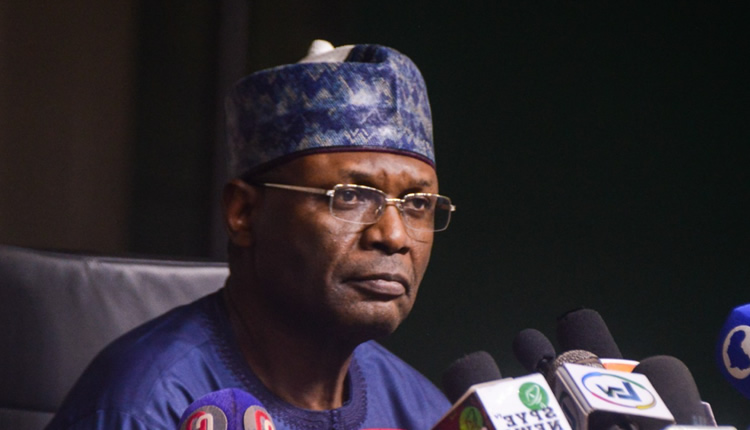From Adesuwa Tsan, Abuja
In a move widely seen as a decisive step toward deepening democratic governance, the Senate has passed for second reading the Electoral Act (Amendment) Bill 2025, which seeks to hold the presidential, governorship, National Assembly, and State Assembly elections on the same day across the country.
The bill which is sponsored by Sen. Saliu Mustapha (Kwara Central), seeks to amend the Electoral Act 2022 to reduce the very high cost of elections. It proposes a drastic overhaul of Nigeria’s current staggered election system, reducing expenses, and restoring public confidence in the electoral process.
The bill also seeks to shorten the campaign period to ease financial burdens on political parties, candidates, and the government. Additionally, it would allow elected officials such as the President, Vice President, Governors, and legislators, to serve as ad hoc delegates during party congresses.
Senator Mustapha, during the debate, lamented the soaring cost of elections, noting that expenses had skyrocketed from ₦1.5 billion in 1999 to ₦350 billion in 2023. “The current staggered election process is expensive and inefficient. Conducting all elections on the same day will save costs, boost voter participation, and reduce political tension,” he said.
Nigeria’s elections has been repeatedly marred by last-minute postponements. In 2015, polls were delayed by six weeks due to Boko Haram insurgency. In 2019, presidential and National Assembly elections were postponed just five hours before voting began, sparking nationwide outrage. While the 2023 elections held as scheduled in most areas, some communities experienced delays due to insecurity and logistics issues.
Ezenwa Nwagwu, a board member of YIAGA Africa, an election-focused civil society organization supported this move, saying “These repeated delays have undermined public confidence and contributed to voter apathy. A one-day election could bring predictability and strengthen the process’s integrity.”
Senator Mustapha emphasized the economic benefits of the reform, arguing that having election on single day would drastically cut costs and improve efficiency. The Independent National Electoral Commission (INEC) has repeatedly warned that mobilising materials and personnel multiple times across Nigeria is both expensive and exhausting, therefore streamlined process, it said, could reduce errors and logistical failures.
The bill also aims to curb excessive campaign spending by shortening the election cycle. Additionally, it seeks to lower security expenditures and increase voter turnout by simplifying participation.
Cynthia Mbamalu, Director of Programmes at Yiaga Africa added her voice to support the bill, saying: “Many Nigerians only turn up for presidential elections and ignore others. If all elections are held on the same day, voters are more likely to engage with all levels of governance, at the federal, state, and legislative. That’s a win for democracy.”
Skepticism
While many lawmakers back the bill, some urge caution. Sen. Enyinnaya Abaribe (Abia South) welcomed the proposal but warned, saying, “This is a good idea in theory, but implementation must be carefully managed. We must ensure INEC has the capacity to conduct multiple elections in one day without compromising transparency.”
Similarly, Sen. Adams Oshiomhole (Edo North) noted, “While the bill has good intentions, we must ensure INEC is adequately prepared for the enormous task of conducting elections for all levels of government simultaneously.” He also cautioned that multiple ballot papers on a single day could confuse illiterate voters.
The Peoples Democratic Party (PDP) was very cautious in its support. Debo Ologunagba who is the party’s National Publicity Secretary, said: “We welcome reforms that strengthen democracy, but stakeholder consultations are essential to avoid unintended consequences.”
Civil society groups, however, see the bill as long overdue. Clement Nwankwo the Convener of the Situation Room said of the bill, “Nigeria has experimented long enough with staggered elections. It’s time to adopt a more efficient approach.”
Advocates like Professor Ayo Ojebode, a political communications expert point to countries like Brazil, Indonesia, and the United States, where simultaneous elections are conducted successfully. “Same-day elections are the global norm in many democracies. With the right investment in technology and manpower, Nigeria can achieve this,” he said.
Next steps
Having passed second reading, the bill will now undergo public hearings and committee scrutiny before proceeding to the House of Representatives. INEC is expected to present its position during consultations. If passed and signed into law, the reforms could take effect by the 2027 general elections.
The proposed amendment represents a bold attempt to address Nigeria’s electoral challenges which are cost, logistics, voter apathy, and institutional trust, while also aligning with global best practices. As the bill progresses, its success will hinge on political will, administrative capacity, and public support. If well-executed, it could mark a turning point in Nigeria’s journey toward electoral integrity and democratic resilience.

